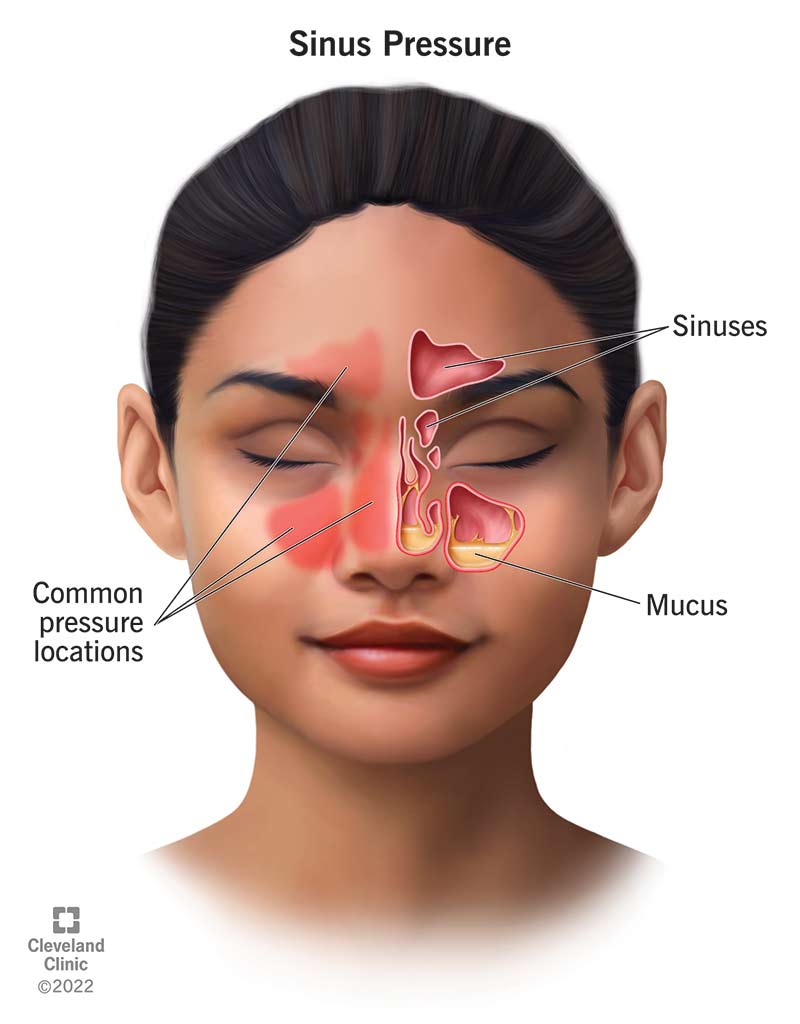Sinus pressure occurs when the membranes that line your nasal passages become irritated or inflamed. Mucus may also build up and stop draining, leading to pain and pressure. Causes include colds, allergies and sinus infections. Taking over-the-counter medications and keeping your sinuses moist can help ease discomfort.

Sinus pressure occurs when the membranes that line your nasal passages get irritated or swollen due to colds, allergies, sinus infections or other conditions. Mucus can also build up and stop draining properly, leading to pain and pressure.
Sinus pressure might feel like tightness or achiness in your face — particularly around your eyes, nose, forehead or cheekbones. Sinus pressure can even radiate to other areas, like your scalp, teeth and jaws.
Advertisement
Cleveland Clinic is a non-profit academic medical center. Advertising on our site helps support our mission. We do not endorse non-Cleveland Clinic products or services. Policy
Many conditions can result in sinus pressure. But one of the main causes is the common cold, a viral infection.
Sinus pressure may also result from:
Sinus pressure treatment depends on the associated condition. In many cases, over-the-counter (OTC) medications and facial massage can help relieve your symptoms. However, if you have an infection, you may need antibiotics or other medications that only your provider can prescribe. That’s why it’s important to visit a healthcare provider whenever you feel under the weather.
Advertisement
There are many things you can try at home to ease sinus pressure and pain:
Several different types of OTC medications can help ease uncomfortable symptoms, including:
Keeping your nasal passages moist is one of the most effective ways to relieve sinus pressure. To do this, you can try a nasal saline spray or gel.
For nasal irrigation, use a bulb irrigator, a Neti pot or a pre-filled container of saline. Holding your head over a sink, pour the saline solution into one nostril and allow it to drain out of the other. As the solution passes through your sinuses, it washes away irritants and allergens that can cause inflammation. (Note: Be sure to use distilled or sterile water to lower your risk of infection.)
There are several pressure points around your face where sinus pressure tends to build up. Massaging these areas can help relieve some of your symptoms. To do this, use your fingers to massage these areas in a circular motion:
It’s critical that you stay hydrated, especially if you’re congested. Dehydration can make sinus pressure worse. Drink plenty of water to ease your symptoms faster.
Breathing in steam can help open your nasal passages and relieve sinus pressure. The simplest way to do this is to take a hot shower or use a humidifier.
You can also boil water, pour it into a bowl and lean over it with your head a few inches above the water’s surface. Cover your head with a towel and breathe deeply through your nose. Be very careful when using this method. Handle the bowl carefully and place it on a stable surface to avoid burning yourself.
Before you go to sleep, prop yourself up on a few pillows. Simply elevating your head can help you breathe more comfortably.
You can’t always prevent sinus pressure. But there are a few things you can do to reduce your risk:
Advertisement
You should call a healthcare provider if you have:
Sinus pressure can result in general facial discomfort. In particular, you might feel tightness or soreness around your:
In some cases, yes. If pressure starts to build up in your middle ear, then you may experience dizziness or vertigo.
Yes. Sinus pressure commonly refers (radiates to) tooth pain, especially around your upper molars.
A note from Cleveland Clinic
Sinus pressure can be an annoying and inconvenient symptom of several health conditions. Though it’s usually not serious, it can have a negative impact on your quality of life. There are many things you can do at home to relieve sinus pressure and pain. But if you have a fever or symptoms that last longer than 10 days, schedule a visit with your healthcare provider.
Last reviewed on 02/09/2023.
Learn more about the Health Library and our editorial process.
Advertisement
Cleveland Clinic is a non-profit academic medical center. Advertising on our site helps support our mission. We do not endorse non-Cleveland Clinic products or services. Policy